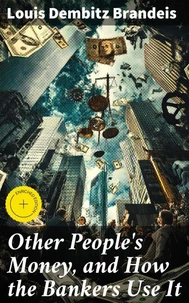Other People's Money, and How the Bankers Use It
Par :Formats :
Disponible dans votre compte client Decitre ou Furet du Nord dès validation de votre commande. Le format ePub est :
- Compatible avec une lecture sur My Vivlio (smartphone, tablette, ordinateur)
- Compatible avec une lecture sur liseuses Vivlio
- Pour les liseuses autres que Vivlio, vous devez utiliser le logiciel Adobe Digital Edition. Non compatible avec la lecture sur les liseuses Kindle, Remarkable et Sony
 , qui est-ce ?
, qui est-ce ?Notre partenaire de plateforme de lecture numérique où vous retrouverez l'ensemble de vos ebooks gratuitement
Pour en savoir plus sur nos ebooks, consultez notre aide en ligne ici
- Nombre de pages121
- FormatePub
- ISBN859-65--4724851-4
- EAN8596547248514
- Date de parution04/09/2022
- Protection num.Digital Watermarking
- Taille513 Ko
- Infos supplémentairesepub
- ÉditeurDIGICAT
Résumé
In "Other People's Money, and How the Bankers Use It, " Louis Dembitz Brandeis delivers a critical examination of the American banking system and the pervasive influence of financial institutions on the economy. Written in the early 20th century, this work employs a clear and persuasive prose style, reflective of Brandeis's legal background and commitment to social justice. The book is a profound analysis of the moral and economic implications of unchecked banking practices, outlining how the concentration of power within banks erodes public welfare and undermines democracy.
With well-researched case studies and incisive arguments, Brandeis's insights remain relevant in today's financial climate, providing a keen critique of capitalism's excesses. Brandeis, often referred to as the "people's lawyer, " was a prominent figure in American jurisprudence and a fervent advocate for consumer rights and social reform. His experiences, including his participation in landmark legal cases and his advocacy against monopolistic practices, deeply informed his views on banking and corporate power.
As a trailblazer for the progressive movement, Brandeis sought to illuminate the dangers posed by the financial elite, aiming to empower the common citizen against exploitation. "Other People's Money" is a must-read for anyone interested in economics, finance, or social justice. Brandeis's articulate deconstruction of banking practices not only challenges the status quo but also encourages readers to think critically about their role in financial systems.
This book speaks to contemporary issues, making it a vital resource for understanding the intersection of finance and democracy.
With well-researched case studies and incisive arguments, Brandeis's insights remain relevant in today's financial climate, providing a keen critique of capitalism's excesses. Brandeis, often referred to as the "people's lawyer, " was a prominent figure in American jurisprudence and a fervent advocate for consumer rights and social reform. His experiences, including his participation in landmark legal cases and his advocacy against monopolistic practices, deeply informed his views on banking and corporate power.
As a trailblazer for the progressive movement, Brandeis sought to illuminate the dangers posed by the financial elite, aiming to empower the common citizen against exploitation. "Other People's Money" is a must-read for anyone interested in economics, finance, or social justice. Brandeis's articulate deconstruction of banking practices not only challenges the status quo but also encourages readers to think critically about their role in financial systems.
This book speaks to contemporary issues, making it a vital resource for understanding the intersection of finance and democracy.
In "Other People's Money, and How the Bankers Use It, " Louis Dembitz Brandeis delivers a critical examination of the American banking system and the pervasive influence of financial institutions on the economy. Written in the early 20th century, this work employs a clear and persuasive prose style, reflective of Brandeis's legal background and commitment to social justice. The book is a profound analysis of the moral and economic implications of unchecked banking practices, outlining how the concentration of power within banks erodes public welfare and undermines democracy.
With well-researched case studies and incisive arguments, Brandeis's insights remain relevant in today's financial climate, providing a keen critique of capitalism's excesses. Brandeis, often referred to as the "people's lawyer, " was a prominent figure in American jurisprudence and a fervent advocate for consumer rights and social reform. His experiences, including his participation in landmark legal cases and his advocacy against monopolistic practices, deeply informed his views on banking and corporate power.
As a trailblazer for the progressive movement, Brandeis sought to illuminate the dangers posed by the financial elite, aiming to empower the common citizen against exploitation. "Other People's Money" is a must-read for anyone interested in economics, finance, or social justice. Brandeis's articulate deconstruction of banking practices not only challenges the status quo but also encourages readers to think critically about their role in financial systems.
This book speaks to contemporary issues, making it a vital resource for understanding the intersection of finance and democracy.
With well-researched case studies and incisive arguments, Brandeis's insights remain relevant in today's financial climate, providing a keen critique of capitalism's excesses. Brandeis, often referred to as the "people's lawyer, " was a prominent figure in American jurisprudence and a fervent advocate for consumer rights and social reform. His experiences, including his participation in landmark legal cases and his advocacy against monopolistic practices, deeply informed his views on banking and corporate power.
As a trailblazer for the progressive movement, Brandeis sought to illuminate the dangers posed by the financial elite, aiming to empower the common citizen against exploitation. "Other People's Money" is a must-read for anyone interested in economics, finance, or social justice. Brandeis's articulate deconstruction of banking practices not only challenges the status quo but also encourages readers to think critically about their role in financial systems.
This book speaks to contemporary issues, making it a vital resource for understanding the intersection of finance and democracy.


